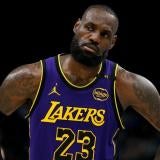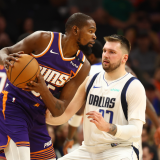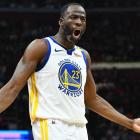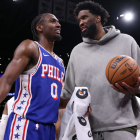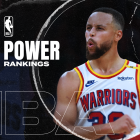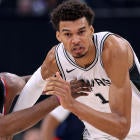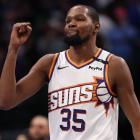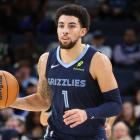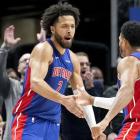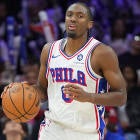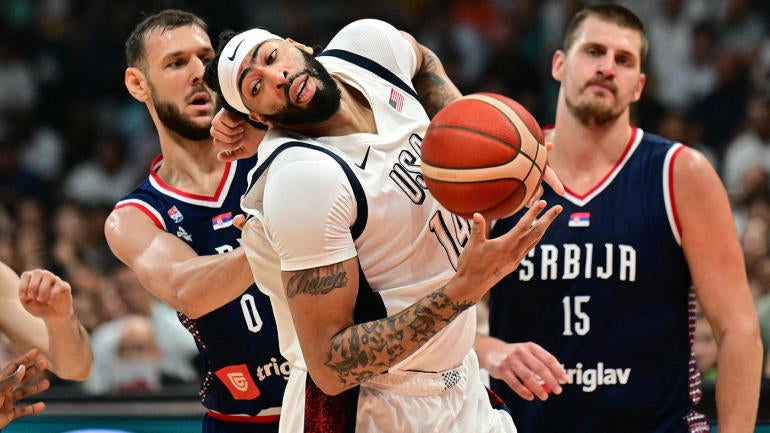
The recruitment of Joel Embiid was probably the single-biggest roster-building story for Team USA leading into the 2024 Olympics. After Jaren Jackson Jr's poor performance at the 2023 FIBA World Cup, Team USA decided it needed a more traditional big man. It targeted Embiid, the reigning MVP at the time and a naturalized American citizen. But there was competition.
France wanted him badly. A letter that Embiid allegedly wrote to French president Emmanuel Macron asking for citizenship so he could play for them leaked in April, and when he chose to play for Team USA, former French player Frederic Weis was so mad about it that he suggested Embiid be banned from entering the country for the Olympics. Needless to say, there is bad blood here.
Given all of the hoopla that went into getting Embiid to play for Team USA, his performance through three exhibition games, including their 105-79 win over Serbia on Wednesday, has been somewhat underwhelming. He fouled out of the first exhibition, a win over Canada. He's scored 23 total points on 7-of-19 shooting through three exhibitions, all of which he's started. He had the worst plus-minus of any American to play at least 10 minutes against Serbia, a matchup he was specifically brought in to help Team USA win. The Americans needed a bigger, bulkier big man to throw at Nikola Jokic, who shot poorly on Wednesday, but that had more to do with his own finishing than Embiid's defense.
Embiid's backup, Anthony Davis, came with less fanfare. When asked throughout the process, his response was always something along the lines of "I'd be happy to play if I'm asked." He's backed up Embiid through three games and he's outplayed him in all three. He had six blocks against Serbia and has 12 through the three games thus far. He's shooting 13-of-24 from the floor and dominating the paint whenever he's in the game. It's still early, but he's making a compelling case to start over Embiid when the games begin in Paris.
His defense is the obvious driver of that case. FIBA's slightly different rules have supercharged Davis on that end of the floor. With no defensive three-second rule, he's free to protect the rim as aggressively as he wants. The lighter goaltending restrictions allow him to use his quickness, length, and leaping ability to play balls off the rim. Embiid, probably due to the injury he dealt with in the playoffs impacting his conditioning, isn't moving well enough right now to benefit in quite the same ways. In fact, opponents have thus far been able to attack him in drop-coverage, trying floaters over him in space, trusting that he wouldn't be able to contest them.
But there are offensive benefits to playing Davis with the starters as well. Embiid is the better offensive player in an NBA setting, where individual shot creation is at a premium. Team USA doesn't need to revolve its offense around any single player in the way that the 76ers do because they have a roster full of stars capable of sharing the load. That makes the little things significantly more valuable on this specific team. The more mobile and vertical Davis offers a dimension in pick-and-roll that Embiid doesn't.
That is especially true, given the presence of LeBron James. It might be hard to believe, given what a small portion of LeBron's career it represents, but the five years they've spent together is the longest stretch any two Team USA players have spent on the same NBA team. The starters have struggled to establish an identity with a group of older players who have overlapping skill sets. Slot Davis in next to James and Team USA can build a lot more actions around their well-established two-man game. Embiid, meanwhile, would have a bit more freedom to play his way on a bench unit featuring slightly less scoring.
There are drawbacks to making this sort of change. Obviously, we don't know what sort of promises were made to Embiid during the recruiting pitch, for example, and benching him risks losing him and dividing the locker room. But the bench groups that have dominated these exhibition games have also done so through speed and athleticism. The Davis-Bam Adebayo frontcourt has been at the center of that success. Swapping in Embiid fundamentally changes how that group can play. He's not exactly suited to the sort of pace that Tyrese Haliburton and Anthony Edwards want to play at.
Team USA's talent advantage offers a significant margin for error. Steve Kerr doesn't necessarily have to optimize every single lineup in the Olympics as he does in the NBA for the simple fact that he is almost always going to have five of the six or seven best players on the floor at any given moment. If starting Embiid maintains harmony in the locker room, that alone is enough to justify it. Team USA is likelier to beat itself than be beaten by any team in this field. Whatever steps prevent them from doing so are worthwhile.
But if these spots are being assigned on merit, Davis is earning one in these exhibition games. He hasn't just been the team's best center, but the team's best overall player thus far. If there's any sort of competition playing out here, Davis is winning.
Looking for more NBA coverage? John Gonzalez, Bill Reiter, Ashley Nicole Moss and special guests dive deep into the league's biggest storylines daily on the Beyond the Arc podcast.







